
The École Polytechnique Fédérale de Lausanne is a public research university in Lausanne, Switzerland. Founded in 1969 with the mission to "train talented engineers in Switzerland", it is inspired by the École Centrale Paris.
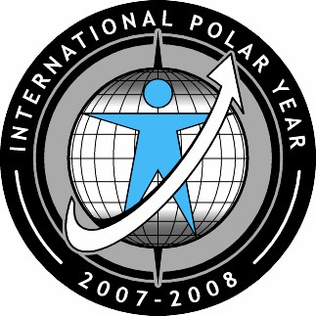
The International Polar Years (IPY) are collaborative, international efforts with intensive research focus on the polar regions. Karl Weyprecht, an Austro-Hungarian naval officer, motivated the endeavor in 1875, but died before it first occurred in 1882–1883. Fifty years later (1932–1933) a second IPY took place. The International Geophysical Year was inspired by the IPY and was organized 75 years after the first IPY (1957–58). The fourth, and most recent, IPY covered two full annual cycles from March 2007 to March 2009.

Ruth Dreifuss is a Swiss economist, unionist and politician who served as a member of the Federal Council (Switzerland) from 1993 to 2002. She served as Vice President of Switzerland in 1998 and as President of Switzerland in 1999 for the Social Democratic Party.
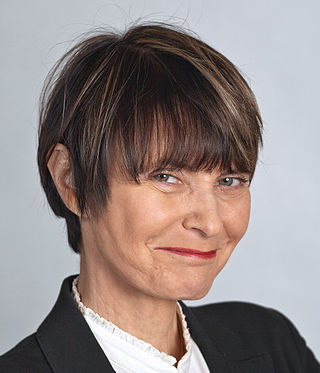
Micheline Anne-Marie Calmy-Rey is a Swiss politician who served as a Member of the Swiss Federal Council from 2003 to 2011. A member of the Social Democratic Party (SP/PS), she was the head of the Federal Department of Foreign Affairs during her tenure as a Federal Councillor. She was President of the Swiss Confederation twice, in 2007 and 2011.
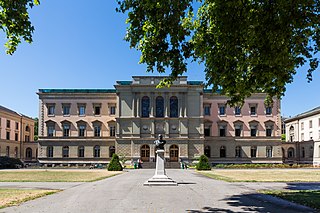
The University of Geneva is a public research university located in Geneva, Switzerland. It was founded in 1559 by French theologian John Calvin as a theological seminary. It remained focused on theology until the 17th century, when it became a center for enlightenment scholarship. Today, it is the third largest university in Switzerland by number of students.
The Swiss Academies of Arts and Sciences is a Swiss organization that supports and networks the sciences at a regional, national and international level. They are designated by the Federal Act to Promote Research and Innovation to promote research together with the Swiss National Science Foundation. Its current president is Yves Flückiger.

The Swiss Graduate School of Public Administration is a Swiss graduate school of public administration. In 2014, the independent foundation was integrated into the University of Lausanne.
swisspeace - the Swiss Peace Foundation is a practice and research institute located in Basel, Switzerland promoting effective peacebuilding. Partnerships with local and international actors form the basis of its work. Together with its partner organizations, swisspeace manages strategies and interventions to reduce violence and promote peace in conflict-affected contexts.
The Swiss Finance Institute (SFI) is a national center for research, doctoral training, knowledge exchange, and continuing education in the fields of banking and finance. Created in 2006 as a public–private partnership, SFI is a common initiative of the Swiss finance industry, leading Swiss universities, and the Swiss Confederation.
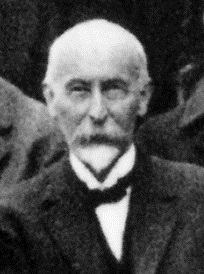
Charles-Eugène Guye was a Swiss experimental physicist noted for his experiments showing the dependence of the electron mass on its speed and attending the Solvay Conferences.
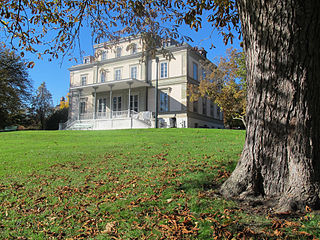
The Geneva Academy of International Humanitarian Law and Human Rights is a postgraduate joint center founded in 2006 and located in Geneva, Switzerland. The faculty includes professors from both founding institutions and guest professors from major universities.
Physics outreach encompasses facets of science outreach and physics education, and a variety of activities by schools, research institutes, universities, clubs and institutions such as science museums aimed at broadening the audience for and awareness and understanding of physics. While the general public may sometimes be the focus of such activities, physics outreach often centers on developing and providing resources and making presentations to students, educators in other disciplines, and in some cases researchers within different areas of physics.
Xavier Oberson is ordinary professor in Swiss and international tax law at the Faculty of Law at the University of Geneva since 1994. He is also the founder and director of the LL.M. Tax at the University of Geneva.
Jean-Pierre Wolf is a French and Swiss physicist and biophotonics expert and a professor at the Applied Physics Department (GAP) of the University of Geneva.
The Faculty of Translation and Interpreting (FTI) is a faculty of the University of Geneva in Switzerland.
The Global High-Level Panel on Water and Peace was created in 2015 in Geneva at the initiative of 15 co-convening UN Member States to analyse water in the context of maintaining peace and security and to move this issue from a technical to a political level. Chaired by Dr. Danilo Türk, the former President of the Republic of Slovenia, the Panel presented its landmark report, A Matter of Survival, in Geneva in 2017. The Geneva Water Hub, acted as Secretariat to the Panel. The Strategic Foresight Group was the main intellectual partner of the Panel.
Christian Lüscher is a Swiss neurobiologist and full professor at the Department of Basic Neurosciences of the University of Geneva. He is also an attending in neurology at the Geneva University Hospital. Lüscher is known for his contributions in the field addiction, particularly for establishing links of causality between the drug-evoked synaptic plasticity and adaptive behavior in mice.
Video games in Switzerland have been released since the 1980s. In 2016, there were between 100 and 120 game companies, mostly small, corresponding to about 500 employees and a turnover of about 50 millions Swiss francs.
Sophie Schwartz is a Swiss neuroscientist who is a professor at the University of Geneva. She studies the neural mechanisms that underpin experience-dependent changes in the human brain.

Yves Flückiger is a Swiss economist and former rector of the University of Geneva, where he served until 2024. His tenure included initiatives focused on research, digitalization, and international partnerships.